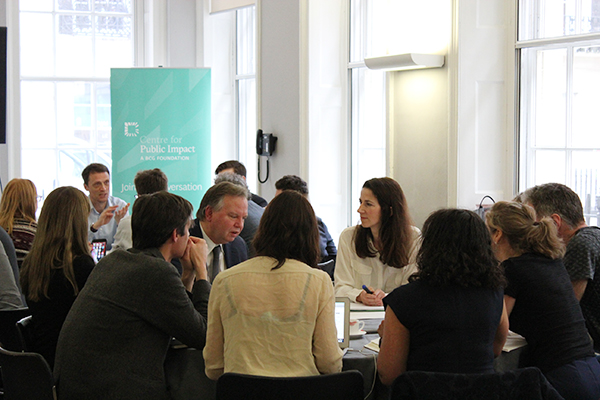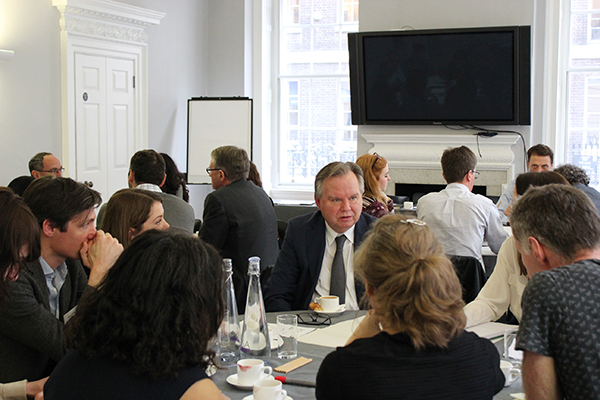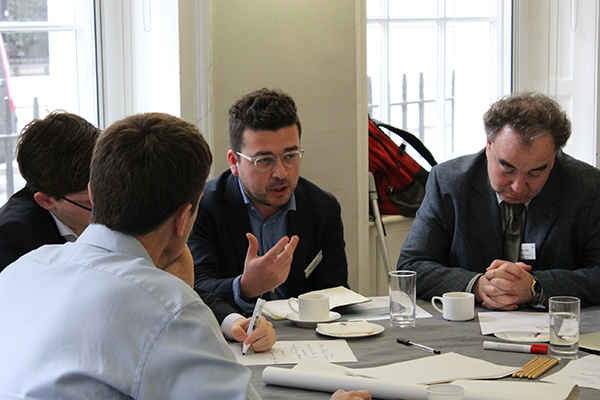Recently the RSA has hosted two seminars with the Centre for Public Impact (CPI) that focused on new approaches for impactful policymaking. In the face of high policy failure rates, we wanted to consider how policymakers could be more cognisant of and adaptive to the range of factors that influence whether a policy will succeed.

Harnessing insights gained from over two hundred public policy case studies, CPI has boiled down the ingredients of impactful policies to three things: Policy, Action and Legitimacy. Of course, policymakers have to design good policy, but equally they need to consider the how and who of implementation and whether there is even support in wider society for the policy’s goals.
At present these considerations tend to be made by different people at different points in the lifecycle of a policy. Our policy making process often produces a mash of badly joined up thinking and strategy, contradictory incentives and, all too often, failure.
What would a policymaking system that considered these factors in a coherent and holistic fashion look like? For the RSA, part of the answer is that government needs to become better at ‘seeing like a system and acting like an entrepreneur’.
Rather than identifying a policy problem and launching straight into solving it, politicians and policymakers should develop a robust account of the wider system in which a problem sits – are there other underlying issues to tackle first? Instead of viewing a problem in isolation policy makers need to develop an account of why a particular social equilibrium exists and be able to provide a credible vision of a different, more benign, equilibrium.
With this vantage point, policymakers could then act in more tactical – entrepreneurial – ways; for example, making a series of initial smaller interventions to prepare the ground for a larger change later on. Or perhaps recognising that policy levers cannot be pulled until the public has been convinced of the need for action.

Moves are being made in this direction. Dr Andrea Siodmok described how Policy Lab deploys insights from design thinking and stakeholder engagement to help policymakers develop better systems understanding. Dr David Halpern, Chief Executive of the Behavioural Insights Team, spoke of his ‘radical incrementalism’ approach to introduce behavioural science – or ‘nudge’ – insights to expand government thinking.
However, as tends to happen when you bring thoughtful people together, our seminars posed new challenges. Using their extensive experience as policy makers in central and local government, Jill Rutter, Gavin Kelly and Barry Quirk described just how difficult it is to introduce more systematic and agile methods to the centre.
Reeling off a list of factors that make policymaking so messy, Gavin Kelly reminded us that the tumult of politics is often the real barrier to better policymaking. He spoke about chronic systems inertia, the challenge of engaging citizens meaningfully and the recurrence of counterproductive ‘policy vandalism’ where good policies are ditched simply because they emerged from a different administration. In reality politics is often the poison to good policymaking.
In concurrence, Jill Rutter pointed out that policy often goes wrong well before the point of applying the kind of systemic thinking advocated by RSA and CPI. Often unclear in their aims or responding to pressure from the media or their political party, politicians have a tendency to rush out policy directives without proper thought or even identifying a genuine problem that needs to be solved. Jill’s points go to the heart of the complex, conflict-driven relationship between politics and policy. At its worst, politicians give rushed, ill thought through directives to their civil servants who then are forced to make the best of what they probably know is destined for failure.

We need to consider how to reset this relationship. This as we have argued before requires reforming politics and policymaking in concert, not as separate entities.
Imagine a system whereby ministers, barring a few key areas, were appointed not as implicitly rival departmental heads but rather as leaders of ‘change teams’ consisting of individuals with varied skills in, and even outside, of government. Rather than being held to ill-fitting manifesto pledges or the responding to media or political pressure, these change teams could address a challenge as they saw fit from inception to delivery.
Could Whitehall ever really operate in this way? A number of attendees at our roundtables were sceptical, citing the Westminster system’s deep resistance to change. In line with the RSA’s commitment to greater devolution local government is the more suitable place to devote energy to prototyping new ways of politics and policymaking.
Yet we can’t give up on the centre. The combination of continuing policy failure, public discontent and the emergence of good practice at the margins could provide sufficient impetus for radical change. It’s hard to see risks being taken while ministers labour under the shadow of Brexit but perhaps we should be starting now to imagine what policy making could be like once that punishing process is complete.
This blog post was written by ARC intern Jake Thorold with my input
Related articles
-
Our way through - part two: Life in the system
Anthony Painter
In part two of the Our Way Through essay series, Anthony Painter considers whether our current relationships with money, power and technology are helping or hindering society's progress.
-
Did you attend the first RSA Fellowship Townhall in September 2021?
Laura Jackson
A new CEO, a new format and new ideas – Andy Haldane marked his first day as head of the RSA in September with our first virtual Fellowship Townhall.
-
The public are ready to go further and faster on net zero
Anthony Painter
The public are ahead of policy-makers and, indeed, most of the business world. COP26 is an enormous opportunity to catch up. Global leaders should take it.





Join the discussion
Comments
Please login to post a comment or reply
Don't have an account? Click here to register.
In a messy world, perceived problems arrive into the public/political sphere in their neatly-wrapped box. Understanding them and what underlies them as well as tackling them involves a much wider and more complex set of issues, which may interact with other "problems", at different stages of assessment/resolution, than either politicians or the media can cope with. Though the Civil Service has got better at the policy-making process (while there is still a fair way to go), the urgent requirements of politicians (and often the public) can stymie even a sensible policy-making process. But beyond that are the institutional barriers which a series of Whitehall initiatives and departmental reorganisations have failed to solve. We need to be looking at a framework which can meet the needs of politicians (which we should not expect to change in the short or longer term) while tacking these issues more effectively. But not going about it too fast or rigidly. Perhaps start with encouraging a couple of Secretaries of State to be given overarching responsibility for some cross-cutting policy issues - the problem of generational underachievement and disadvantage - with a budget to tackle it and the ability to bring together a team from the relevant government departments, external expertise, including perhaps that of people directly affected by these issues. use it both to tackle the problems but also to learn what works and what doesn't in this type of structure and what lessons can be drawn for extending it or doing it differently. And the best use of "central departments" in such circumstances is both to smooth the path, but also be a critical friend, keeping an eye on how the policies and implementation programme which emerges fit within the surrounding territory, where change won't stop while this process is being gone through.
Failure is inevitable (at least this is what one takes away from reading the excellent "The Blunders of our Governments" by King and Crewe. What is not inevitable is that we will learn from them.
Striving to understand the system (better) and act entrepreneurly (Simon Maxwell, ex ODI Director, would say: as a policy entrepreneur (part engineer, part networker, part story-teller and part political fixer)) sounds very appealing. How much of it is possible, though.
Efforts to incorporate policy labs and delivery units into the Peruvian system, for instance, appear to offer an alternative to an urgent reset of the civil service. These have been sold as surgical policy strikes to fix the most complex policy design and delivery problems.
We can expect many blunders. King and crew warn against petit-comité design (even if the comité is made of bright minds) technocratic solutions. They warn against thinking that politics must be taken out of the equation if we want good policymaking.
The phrase: "above seems at odds with the idea that good policymaking is good politics. Can it be true in one direction but not in the other?
Let's:
Let's but let's not get carried along. Posible blunders that the policy labs and the delivery units in Peru are likely to be explained by their uncomfortable fit with the rest of the system. They are (maybe, we do not know yet) islands of excellence in an otherwise broken system. In the UK, ministers cannot be leaders of change teams from within and outside government because the British system is driven by its party system. It has its problems, sure, but it is far better than alternative models in which each minister is appointed for its "independence" and expected to lead in what ever direction its entrepreneurial instincts directs.
Jill Rutter's view:
reminds me of an interview by Matt Forde (I think with Alan Johnson) in which the interviewee aludes to the powerlessness of the PMs and Ministers to dictate the agenda. Most of the time, in fact, all they can do is weather the storm. Their tenure will be judged by their ability to steer forward as best as they could.
To me, this means we need to reconsider what success is in policymaking. Is it the destination or the journey? Is it the efficiency of the delivery or its long term effects? It is its popularity or its endurance?
many thanks and this looks like a good article as it has many of my favourite phrases and I always look forward to reading it. However I would flag up an issue that I have prior to reading and that is I do not agree with more devolution - without education- and that is because the community that I live in, are very dyed in the wool conservative always have and always will be and I shall never have a say. that has been my experience over the past 17yrs. and during the previous election was a tad horrified to find many of the people around being very disrespectful of different opinions- even as far as acting immorally ( but thought they weren't, justifying it because of a belief in the status quo and getting their man in).so I fear for devolution because I believe that there is no narrative spaces in areas of entrenched, majority, political views. And my area is educated mostly to university and after.
It's a great idea to have 'change teams' It is also a lovely thought to think that we could change the way our democracy does politics post-Brexit. If ever there was a time for change, a time to take a hard look at the status quo it's now. I feel however that the tribal nature of politics, rooted in the past and it's refusal to accept anything new and innovative (and I don't mean PR) will mean that politicians will not be open to any meaningful change. They make Sir Humphrey look like a radical.